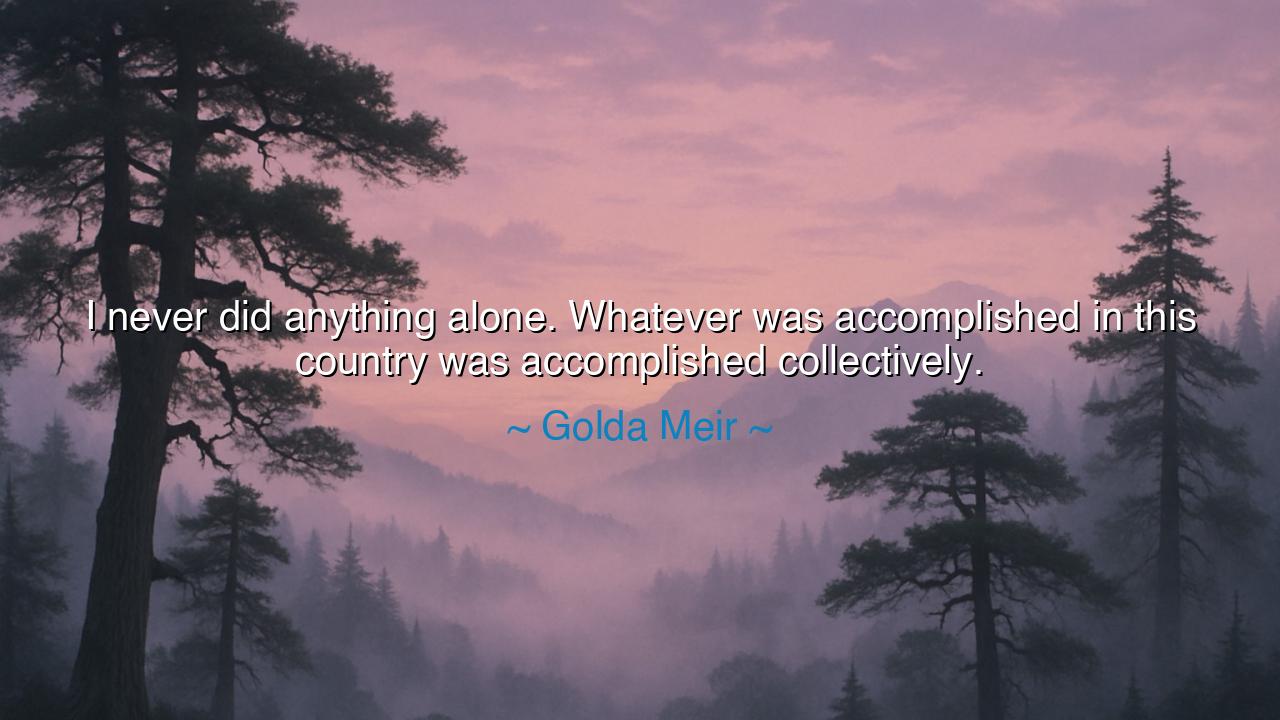
I never did anything alone. Whatever was accomplished in this
I never did anything alone. Whatever was accomplished in this country was accomplished collectively.






"I never did anything alone. Whatever was accomplished in this country was accomplished collectively." These powerful words by Golda Meir, the first female Prime Minister of Israel, serve as a reminder of the importance of unity, collaboration, and collective effort in the pursuit of great accomplishments. Meir, who lived through the formation of a new nation, understood deeply that the creation and survival of Israel were not the achievements of any single individual, but rather the result of the sacrifice, work, and determination of a community united by a common purpose. Her statement is a tribute to the strength that arises when people come together for a shared goal, realizing that true success is always built on the backs of many.
In the ancient world, the concept of collaboration and the necessity of community effort was ever-present. The Greeks, whose philosophers and artists we celebrate today, understood that the greatest advancements in their society—their philosophy, democracy, and art—were not the result of individual efforts alone. Even the mighty Athens, the birthplace of democracy, flourished not because of one great ruler but because of the collective will of the citizens who worked together to defend their city, craft their ideas, and preserve their way of life. Pericles, the statesman who guided Athens through its golden age, knew that success was not in his personal accomplishments, but in the shared effort of his people, working in unity to create something greater than any single individual could achieve.
Consider the great achievements of Rome, which was built upon the efforts of countless individuals. Julius Caesar, though often depicted as a leader of great personal power, did not create Rome’s vast empire alone. His campaigns were supported by a loyal army, skilled generals, and a network of political alliances. Rome’s success was rooted in the idea that leadership must be supported by the collective strength of its people—whether they were citizens, soldiers, or statesmen. Even as Caesar’s power grew, he relied on the counsel and support of those around him, understanding that no great empire could be built by one man’s hand alone.
Meir’s statement also resonates with the story of Mahatma Gandhi, who led India to independence through the collective efforts of millions. Gandhi, though a great leader, understood that the movement for independence was not his alone—it was the combined effort of countless individuals who sacrificed and worked together to free their country from colonial rule. Gandhi’s leadership was rooted in the idea that every individual had a role to play in the success of the nation, and it was through the collective strength of the people, their unity, and their shared belief in freedom that India achieved independence. Gandhi’s genius was in recognizing that true leadership does not lie in personal glory, but in empowering the masses to work together for the greater good.
In more recent times, Nelson Mandela also embodied this idea. While Mandela is often celebrated as the face of the anti-apartheid movement, he was very much aware that his success was not achieved alone. His fight against racial injustice was a collective struggle, supported by countless activists, politicians, and ordinary citizens who rallied together to bring about change. Mandela spent 27 years in prison, but even in his isolation, he never lost sight of the fact that his freedom and the freedom of his people would come not from one man’s vision, but from the efforts of a united community. His leadership was shaped by the people, and he often emphasized that the collective power of the South African people was what made their struggle possible.
The lesson in Golda Meir’s words is both profound and clear: individual achievements are often nothing more than the public face of a much larger, collective effort. Success is never truly the result of one person’s work; it is the product of unity, cooperation, and shared purpose. Whether in political struggles, social movements, or the day-to-day responsibilities of life, we must recognize that we are part of something much larger than ourselves. The contributions of others—our family, friends, colleagues, and community—are what allow us to succeed, and it is through collaboration that we achieve the greatest victories.
In our own lives, we should embrace the power of community. Whether in our careers, our personal lives, or our societal contributions, we must recognize that we are part of a larger whole, and that our actions impact those around us. Leadership is not about individual triumphs, but about the ability to unite others and to work toward a common goal. Just as Meir led Israel through the challenges of its formation with the help of countless others, we too must seek the support and collaboration of those around us, knowing that no great task is accomplished in isolation. Let us build together, strive together, and succeed together, for in unity, we find the strength to achieve what no single individual could ever do alone.






AAdministratorAdministrator
Welcome, honored guests. Please leave a comment, we will respond soon